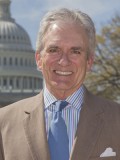By J. Brent Walker, Executive Director
 Frank Lambert, professor of history at Purdue University, has written a new book that deserves our attention and careful reading. Separation of Church & State: Founding Principle of Religious Liberty (Mercer Press, 2014) is based on his BJC-sponsored Walter B. and Kay W. Shurden Lectures on Religious Liberty and Separation of Church and State, delivered at Mercer University in 2012. Lambert’s effort here is much more than a printing of his three spoken lectures — it is an expanded and more thorough treatment of the subject.
Frank Lambert, professor of history at Purdue University, has written a new book that deserves our attention and careful reading. Separation of Church & State: Founding Principle of Religious Liberty (Mercer Press, 2014) is based on his BJC-sponsored Walter B. and Kay W. Shurden Lectures on Religious Liberty and Separation of Church and State, delivered at Mercer University in 2012. Lambert’s effort here is much more than a printing of his three spoken lectures — it is an expanded and more thorough treatment of the subject.
Professor Lambert’s aim in the book — which, in my opinion, he succeeds in achieving — is to “separate propaganda and myth from history” palmed off by Christian right “historians” who resort to a “usable past” to revise history and to support their desire to merge church and state. Based on his own rigorous study of the original documents and historical record, Lambert concludes that “the separation of church and state was indeed a vital constitutional principle” as embodied in the First Amendment.
The book first examines — and then completely debunks — the claim that America was founded as a Christian nation. Lambert shows how the 16th century Christian commonwealth — “the City upon a Hill” — in Massachusetts Bay was a miserable failure and, by 1787, was rejected as a pattern for the new federal government. The Puritan experiment lost out to the model of separation advanced by Thomas Jefferson, James Madison and Baptists, including John Leland and Isaac Backus, who — ironically enough — hailed from Massachusetts!
Moreover, acknowledging that American culture was and is both visibly religious and deeply secular, the Constitution’s religious liberty protections were joint enterprises of “revolutionary evangelicals as well as enlightened statesmen” — a project informed by both the sacred Great Awakening and the secular Enlightenment. Yes, Lambert concedes our Founders were mostly men of faith — sometimes orthodox, sometimes deistic. But they were more interested in ensuring religious liberty through the separation of church and state than ensconcing their religious beliefs in the new government. In short, Montesquieu, more than John Calvin and John Locke, and more than the Ten Commandments, are reflected in our founding documents.
Then, Lambert traces the place of separation of church and state in the development of the early state constitutions during the revolutionary period. Here he compares and contrasts the Puritan experiment in Massachusetts Bay with the post-revolution Virginia model and argues that the latter formed a template for the constitutional convention in 1787.
Finally, Lambert focuses on the separation principle at the federal level. Although the phrase “separation of church and state” does not appear in the First Amendment, the concept surely does. Separation, he argues, was a pervasive principle — not just with respect to church and state, but with the separation of powers (along with the checks and balances) among the three branches of the federal government, as well as separation between the states and the new central government that forms our system of federalism.
Although influenced by their religious convictions, Lambert concludes the Founders were more concerned at the federal level about creating a more perfect union than propagating religion. Religion was at most on the back burner as the Founders tried to counter the centrifugal effect of the Articles of Confederation. They knew they needed a more powerful central government to conduct the affairs of state, but they wanted to guard against state-supported and state-corrupted religion. Not only did they refuse to give the federal government any power to advance religion, they expressly denied its ability to impose a religious test for public office in Article VI and disclaimed any power in the federal government to advance or inhibit religion in the First Amendment.
In short, according to Lambert, “By putting religion on a voluntary, instead of a state-supported, basis, the founders created a free marketplace of religion, a competitive place whereby the various churches could check any single group from imposing its will on the whole nation, an innovative place whereby new religions are spawned and old ones adapt and change to increase their appeal to more people.”
Fittingly, the book is dedicated to Walter and Kay Shurden, the author’s longtime friends and the benefactors of the lectures that spawned this first-rate scholarship written by one steeped in the best of the Baptist tradition. Next year we celebrate the 10th Shurden Lectures. Returning to Mercer University — on both the Atlanta and Macon campuses — the lectures will be delivered by Alan Brownstein, professor at the University of California, Davis, School of Law, on April 7-8. I hope you will be able to join us.
From the September 2014 Report From the Capital. Click here to read the next article.





